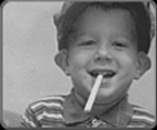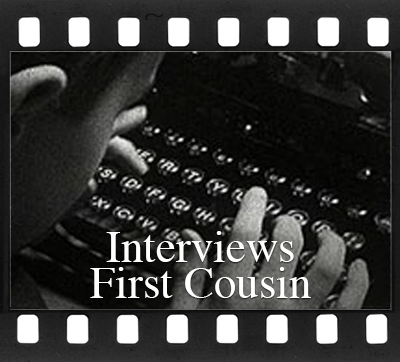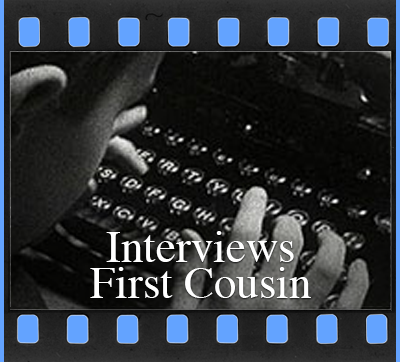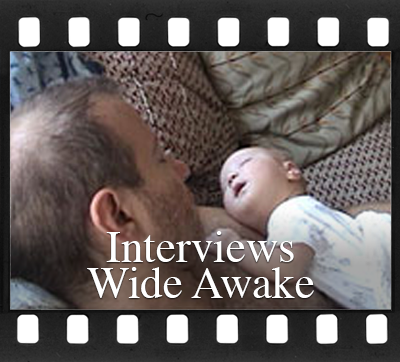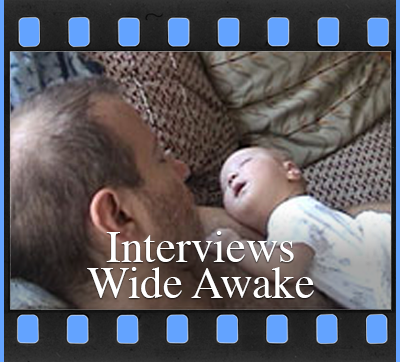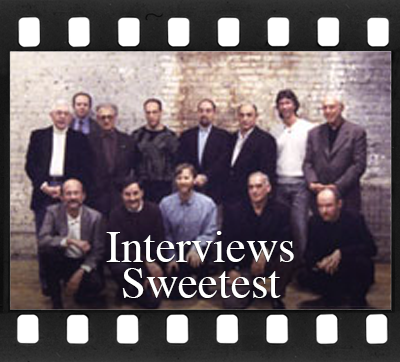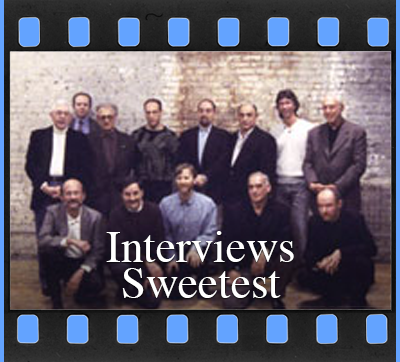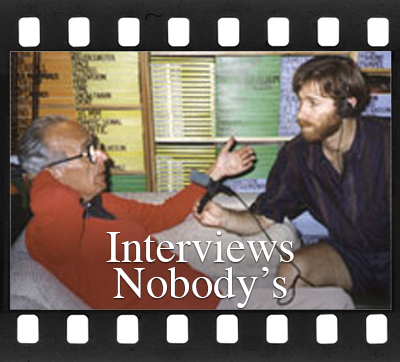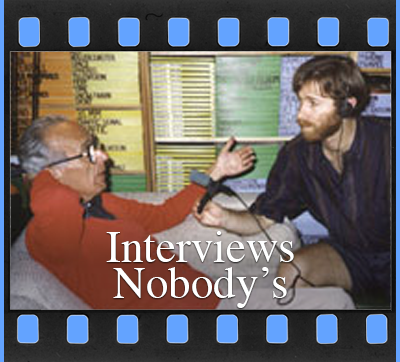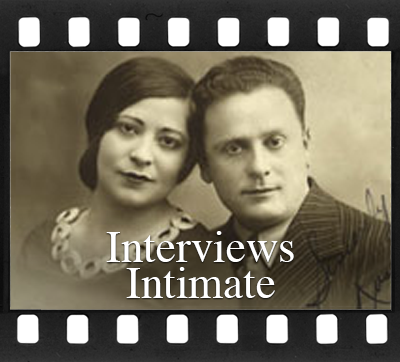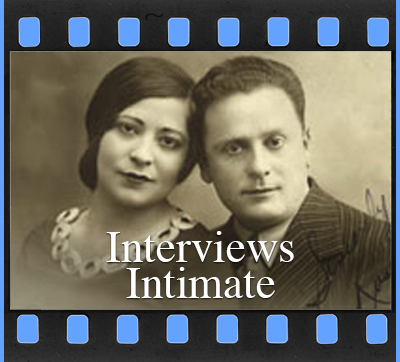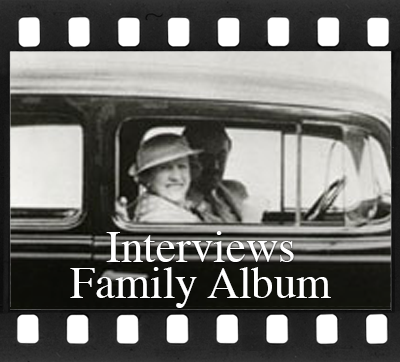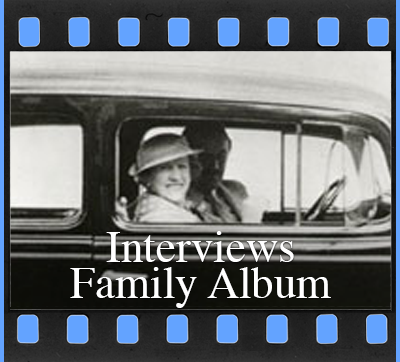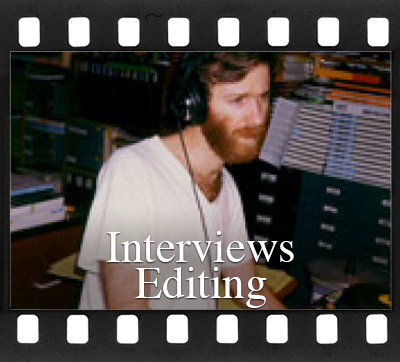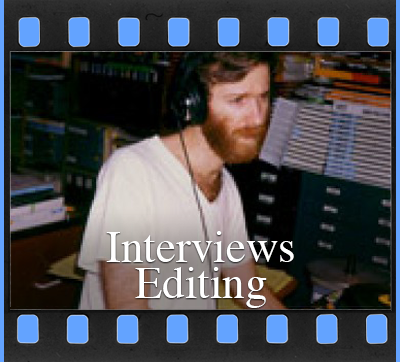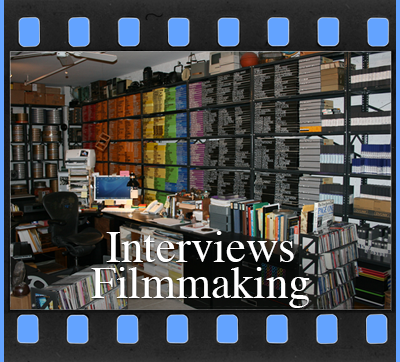Filmmaking
City Arts - Interview with Alan Berliner
Alan Berliner, one of the leading independent filmmakers working today, first achieved recognition with a group of innovative avant-garde films made between 1975 and 1985. But it was his first hour-long experimental documentary, THE FAMILY ALBUM (1986), that placed him at the forefront of experimental documentary filmmaking.
THE FAMILY ALBUM, which critic Roger Ebert called "the most intriguing film" of the 1987 Edinburgh International Film Festival, was included in the 1987 Whitney Museum Biennial Exhibition, received the Golden Gate Award at the San Francisco International Film Festival, and was awarded a Blue Ribbon (First Prize) at the American Film and Video Festival.
INTIMATE STRANGER (1991) has also received a great deal of critical acclaim since its world premiere at the 1991 New York Film Festival, having garnered an EMMY and received the 1993 Distinguished Achievement award from the International Documentary Association. Berliner is a recipient of both Rockefeller Foundation and Guggenheim Foundation fellowships. Selected retrospectives of his films have been presented at both the Museum of Modern Art and the International Center of Photography in New York City, and his films have been broadcast on television worldwide.
His most recently completed film, NOBODY'S BUSINESS, had its world premiere at the 1996 New York Film Festival and will have many screenings in 1997, including the Forum section at the upcoming Berlin International Film Festival, and the Cinema du Reel Film Festival in Paris. It will have it s West Coast premiere at the San Francisco International Film Festival, which will honor it with a Golden Spire Golden Gate Award, and will also appear in other upcoming festivals in Philadelphia, Tampa, and Washington, D.C., among others.
CITY ARTS: Could you talk about your process of filmmaking?
Alan Berliner: Well, for me, the process of making films is always deeply interwoven into the process of editing. And the process of editing is always one of discovery and of the joy of learning about a body of raw material. Discovering what's inside that material and letting the film tell me how it wants to be made. I know that sounds kind of mysterious, but I've never made a film in which that hasn't happened. I very much needed to make NOBODY'S BUSINESS. It's a film about my father and about his life. He's getting on in years. He's now seventy-nine years old and I felt before he left the earth, I needed to confront him. I needed to learn about him. I needed to ask him some questions. On another level, the film is a gift to him. I wanted to have one last conversation with him, to have the heart-to-heart talk we never had. That's what the film became over time. It became a chance for us to talk and if that meant to verbally spar or even yell at one another, that was okay. It was a chance to get everything out in the open. Ironically, because my father is so isolated, so stoical and so reticent to think out loud, the film became a kind of therapy for him. As I say at the end of the film, my father is never more alive, never more alert, never more articulate, never more aware of the issues that he faces in his life, never more aware of his existential presence, than when we have these conversations. In a way, the film became a kind of joint project for us; we became partners. He helped me make this film simply by allowing it to be made.
At various points, my father could have decided to -- and he actually threatens to in the film -- get up and walk away, to grab the microphone and throw it on the floor. Yet in the way that we reciprocated a kind of love to one another, my father agreed to stay with me, to stay the course, to help me in a kind of paternal way -- kind of like helping me with my homework. That was his gift to me. He shared in the process. He didn't run away. He didn't hide. He saw it through, and for that, I'm eternally grateful.
You engaged him in the process.
Sure. I would say at a certain point I thought that the film was going to be a portrait of my father. The more I worked on it, the more I realized that there was no way that I could attempt a portrait of my father without dealing with the implications of our relationship. As a result, the film became a portrait of my relationship with my father, not so much a biography of him. Once I did that, I knew that there was no way I could remove myself from the film.
I was in a position where I couldn't hide. I had to put myself in the film as a participant with him, as a kind of equal player. But I've always felt that this kind of risk-taking, this kind of personal vulnerability, puts me at the edges of a kind of fear -- a fear that in the end becomes the fuel, the adrenaline, that allows me to work in such uncharted emotional territory, where the stakes are very high, but where the rewards -- especially the personal rewards -- are quite meaningful, significant and gratifying.
I want to go back to the question of why you think you make films that are not like other people who make low budget feature films?
I studied film in art school. I studied film in the context of film as a fine art -- like sculpture, like painting, like music. When you make film in that context, the primary criteria for what you do always derives from inner necessity. The work comes out of inner drive, from things that one feels challenged to do, compelled to do, out of inner compulsion, or even obsession perhaps. Coming from that background and having absorbed the meanings and the lessons of that, there was never any question that whatever I did was going to have profound personal meaning to me. In fact, with any film that I've ever made, the only rule I have is that from one project to the next, the task at hand be more challenging and more compelling than the one that preceded it.
For yourself?
For myself. I'm not talking about a technical challenge. I'm talking about it asking more of me, and about me asking more of myself, those parts of me that I've never explored or aspects of me that I've never really exercised. At the same time, part of the way I'm wired makes me trust that I'm cultivating an aesthetic dimension over time. One can see my work as an evolution of sorts, as a development not only of the subject matter of the films, but in terms of my own maturation and growth as a human being and as an artist. There are associations, resonances, footnotes, references and all kind of things that one accumulates as one grows a body of work. I would like to think that it is possible to follow many of the threads that weave throughout my work. To that extent, it's very exciting because I don't know where to go to from here. I know whatever I do from this moment on is grounded in everything that comes before it. I love that idea. Much of it is profoundly mysterious. I know very little about it. Yet I trust it implicitly, more than I trust anything else.
What does that mean for you? What happens when you start? Do you have an idea? Do you have something you've written? Do you have some impulse?
It really varies. In fact it's very interesting because at a certain point during the course of every film that I've ever made, someone has said to me, "What makes you think there's a film here? You're crazy to do this." In 1991, I made a film titled INTIMATE STRANGER about my deceased maternal grandfather. Some of my friends said to me, "What are you doing? Alan, come on, maybe a ten-minute short on him, perhaps. That's all he deserves." But I was steadfast in the notion, that I could derive something universally meaningful out of the life of a seemingly ordinary person.
In the case of my new film, NOBODY'S BUSINESS, I was challenged by the notion that my father, who in many ways is even more ordinary than my grandfather and who more than anyone I've ever known is so self-deprecating, that he actually believes his life is of no value, or of no significance to anybody. Ironically, he was even implying that it should have no meaning or purpose to me as his son. That was unacceptable. Unacceptable. Out of that premise, out of that tension, came the challenge. The more he told me that it was implausible and ridiculous -- and he says so in the film -- the more I needed to make the film. To prove him wrong. To show him that the story of his life could be meaningful to others.
What do you mean?
Something that has always been very important to me is that my films aren't seen to be just about my family per se. I'd like to think that I'm able to transform issues that come up about my family, issues that derive from both the dynamics and the inter-relationships within my family, into a kind of storytelling that other people connect with in their dealings with their own relatives, parents, and families. To that extent, I feel a responsibility to avoid being self-indulgent. I want to speak to issues that transcend my own detail, my own personal specificity, and that talk to broader issues that all kinds of people can relate to.
Do you feel it's valuable being in New York, coming from this artist's background and approaching film the way you do? Does New York offer you things particularly in terms of being a center of the arts?
I don't think I could do what I do outside of New York. In New York one has access to everything -- people, the culture, the diversity, the chaos. New York is my studio. However, the one thing more than anything is energy. To live in New York, to work in New York, is to be plugged into this incredible energy. I can replenish my own personal batteries at any time. Sometimes it's too much and you can overload, but just knowing it's there is very exciting.
That's involved in your creative process in some sense?
Absolutely. There's a philosopher/historian, I think it was William Irwin Thompson, who once said that, historically, civilization is what takes place in cities -- civilization being this sort of evolving notion, the interplay of people and cultures and all sorts of thought systems. Every city is a kind of perpetually evolving experiment. New York City is the greatest, grandest experiment of all.
You have said that New York is a studio in a sense. What do you mean by that? Is it in terms of the fact that there are so many people making films all over?
If I feel like being inspired by a certain type of painting, I go to a specific museum. If I feel like being inspired by a certain type of film, I can probably find it playing in New York today. If I feel like talking to other filmmakers or other artists about problems that I'm having or issues that I need to sort out, there's an incredible spectrum of people out there to speak with. If I feel like taking a walk and thinking, there are all sorts of different places in New York to go to. One place I personally love is Canal Street. Canal Street is this incredible, never-ending source of things and materials. I'm always discovering things on Canal Street, particularly for the sculptures that I do.
We are asking all the filmmakers where they like to see movies either because that particular venue has the kind of things in which you tend to be interested or because you love the space or any number of reasons.
I've seen films and shown my films in universities, classrooms, basements, churches, and synagogues throughout New York City. But I think probably the best place to watch films in New York is the Walter Reade Theater at Lincoln Center. It's the state of the art. They did a beautiful job. The seats are comfortable, the sound is excellent, there is beautiful projection in every format. I love to watch films there. And I especially love to have my films shown there. It's always a pleasure. Film Forum is also a favorite place I love to go to because I like the eclectic programming a lot. For big Hollywood films there's something wonderful about the Ziegfield Theater, particularly the sound system. There's a certain elegance that goes with films there. I've actually seen a few films in their premiere opening night at the Ziegfield, and the film takes on a kind of aura that's very exciting. You feel like you've been to an event.
Your films are almost collages in terms of sounds and images. I wonder if you can tell me a little bit about how, at any given moment, if you were stumbling in here and you were working on something, what you might be engaged with. Do you sit here and watch it and then think, "Oh, I need something," and start sorting through your archives and materials until you find something that suits you?
In order to do the kind of work that I do I have to have two main attributes. One is patience. I have to be patient. I have to accept the notion that my films are getting a little bit better every day. Bit by bit. Day by day. I don't build the whole thing at once. I don't get it right all at once. Slowly, through the accrual of days, I'd like to think that something is building up. I often think of my films as a construction site always in process. The big difference is that the architects know what the building is supposed to look like at the end. The other main ingredient is memory, having a good memory. I'm always keeping in mind hundreds of thousands of images that are orbiting around me. There are almost ten thousand sounds in this space here that I work with. That is why I need to be very, very organized. I'm never in a position that I'm working towards the known. I'd like to think I'm always working toward the unknown. To that extent every day is a discovery. Somehow through this sort of intuitive logic, I trust that as the days go by, I'm forming a structure, building a foundation, and constructing a work that hopefully has the kind of integrity that's going to stand up over time.
How does that work in the grossest physical sense? Do you have to sit here and think, "Boy, I need something here but wanted to have, and don't know what," and then try to think about what shot it might be and then go look for it?
It varies. I've often been asked that and I've tried hard to put it down in words, to almost systematize it. For me, and this is unusual, some sounds will suggest images as readily as some images will suggest sound. I'm always trying to be as alive and alert as I can in the moment in terms of working with the film, whether I'm shooting or editing. As I mentioned earlier, if a film is telling me how to make it--and I believe the film does--I really need to become sensitized enough so that I can hear it. I need to listen carefully to what the film is telling me. There's a delicate dance that happens. I think that one of the problems with films that don't work is that people aggressively impose preconceptions upon them, and don't let the material breathe its way into the process of becoming. You feel the tension between what someone thought they had or what someone wanted to have, and what the actual film was allowed to be -- what it wanted to be.
How would you finish the following statement? "I make films on my own because..."
I make films on my own because I don't know any other way to do it. I'm deeply, deeply involved in every phase of the process. More often than not, I find it quite daunting because I've never been able to divide the various facets or functions of filmmaking into different categories. To me, material is shot to be edited, so when I'm editing I'm thinking about things I need to shoot, and when I shoot, I'm already thinking about connections between images. I've never been able to make those obvious conventional distinctions and, ultimately, that has profoundly influenced the kinds of films that I've made. Up until now, I've made films that are about my family, which keeps things personal, keeps things within my grasp, a self-contained universe that is small enough for me to handle everything. I don't know how much longer I can continue working this way. I could be at the point now where I might welcome some additional assistance and camaraderie in the process of making my films. The truth is that not only do I produce the films and direct the films and shoot them and edit them, but I am also my own messenger, my own production assistant. I transcribe the interviews. I answer my own telephone. I write the checks. I do just about everything. When I'm deep into a project it all becomes an incredibly integrated process that is very, very satisfying and very, very fulfilling. That's at its best. At its worst, it leaves me absolutely exhausted. I think that's one of the reasons that my films take longer to make. When you're doing everything, you can only do so many things at one time. Yet, ultimately, I relish the process, because sometimes when things take a little longer to do, a more thoughtful and elaborately orchestrated process of filmmaking results.
